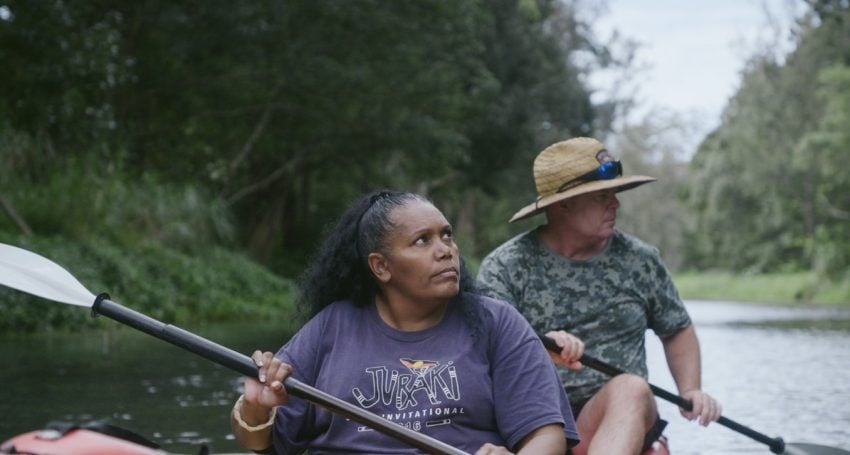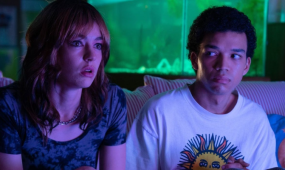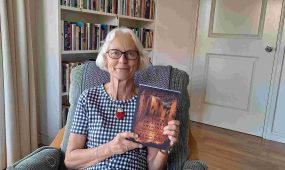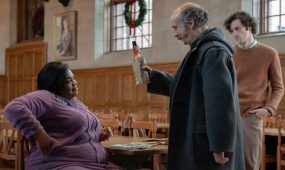The Last Daughter
Reviews
“Brenda’s whole story is a weaving of ‘black’ and ‘white’ cultures together where, in her words, ‘two halves can make a powerful whole’,” say Jennifer (from The Parish of Mudgeeraba) and Mark Stevens (from The Parish of Mudgeeraba and All Saints’ Anglican School)

The Last Daughter is the title of both a recently released book and a documentary that is currently screening in cinemas. Brenda Matthews, author of the book and co-director of this documentary, shares a story that is relevant to every Australian. It reveals truths about a past that our maturing country is still to fully appreciate, while demonstrating a way forward, as Brenda puts it “to healing the wound in our nation”.
Aunty Brenda Matthews is a Wiradjuri woman who, in 1973, was living with her six siblings and her devoted parents in Central West New South Wales. With no warning, all seven children were removed by the government, while her pastor father was at work and her mother stood by distraught and helpless unable to stop their removal.
Shamefully this is a common story in the history of our nation. From the start, Brenda’s gentle and loving parents were determined to fight for the return of their beloved children. However, following some short-term fostering, the siblings were sent to institutions outside Sydney, separating the boys and girls.
After some months Brenda was placed with a “white” family who believed they were adopting her. Brenda was just two years old at the time and so this became the only family she knew in her early childhood. She didn’t see “colour” and her new parents and little “white” sister and brother became her world. Not until this family had a new baby did Brenda see a difference in skin colour and it was then that her new parents felt they needed to share with her that she had birth parents elsewhere with similar skin colour. She also had no knowledge of her other siblings or that they were gradually being returned to her birth parents as the authorities attempted to address the gross wrongdoing inflicted on her birth family.
Advertisement
After five or six years of living with her “white” family, Brenda was returned without warning to her birth family, whom she did not recognise, so becoming “the last daughter” home. The loss and disconnection she felt now separated from her “white” family traumatised her, but she suppressed her pain to avoid hurting her parents. As she matured, those repressed memories surfaced and she longed for the person she still felt bonded to — her little “white” sister. Seeing the effects of Brenda’s hurt and pain give us insight into some of the complexities that Aboriginal and Torres Strait Islander peoples have experienced since colonisation.
The documentary The Last Daughter is Brenda’s journey, as she navigates (what she describes as) “black” and “white” worlds. She shares a very special story of loss and reconnection that is underpinned throughout with love. Like all Aboriginal and Torres Strait Islander stories, Brenda’s is layered with deep meanings and messages about connection and how to move forward with hope and renewal. Due to her forcible removal from her birth family, Brenda felt disconnected from her Aboriginal culture, even into adulthood. Her “white” husband, Mark Matthews, who had been walking with Mob from Fingal Head for many years prior to their meeting, helped reconnect Brenda with her culture. In a beautiful way she describes how she has brought together her “black” and “white” worlds by reconciling her past and moving forward in healing.
Advertisement
The documentary is well filmed using a mix of personal storytelling by Brenda and her family members, along with poignant recreation scenes. A great deal of effort was put into the casting of Brenda as a child, her siblings and both sets of parents. Recreation scenes of Brenda as a child navigating her way through a house alone, with some doors not initially open to her, is cleverly used as a metaphor for Brenda’s journey in finding truths and dealing with her trauma.
The cinematography is beautiful, perfectly capturing Brenda’s journey through and to Country. Bringing the film to the screen was a collaboration between First Nations and non-Indigenous Australians using a cultural framework. This is a non-hierarchical framework focused on relationship and respect. Using this framework helped ensure that cultural protocols between all stakeholders were maintained throughout every aspect of the production.
Brenda developed the documentary with co-director Nathaniel Schmidt over several years, consequently forging a close relationship with him and others involved in the production. Family members and the crew of production company Gravity Films were passionately committed to Brenda’s story being told authentically.
The Last Daughter appeared in both the Adelaide and Gold Coast Film Festivals, receiving the Audience Documentary Award at the former and Best Australian Film at the latter. Brenda’s story resonates with audiences because it offers a deeply personal invitation to join her in a healing journey.
As with the film and her beautiful spirit-led book, Brenda also tells her story in person with audiences around the country. An accomplished speaker, she shares “out of love and forgiveness”, and it is an honour to spend time with her and witness how moved her audiences always are.
In her memoir, Brenda shares many other details, personal insights and learnings that can be appreciated in the reader’s own time. To accompany her book, school resources have recently been developed in collaboration with Brenda. These resources are now available on the Learning Circle website.
Brenda’s whole story is a weaving of “black” and “white” cultures together where, in her words, “two halves can make a powerful whole”. Brenda’s gentle wisdom is an inspiration. Her example to seek healing through love and understanding also shows us a way forward in Reconciliation for all Australians.
Editor’s note: To find out more about Brenda Matthew’s documentary and memoir, or to arrange a documentary screening or to book Brenda as a speaker, please visit Brenda Matthew’s website. The Last Daughter will be screening in cinemas from 15 June 2023.





